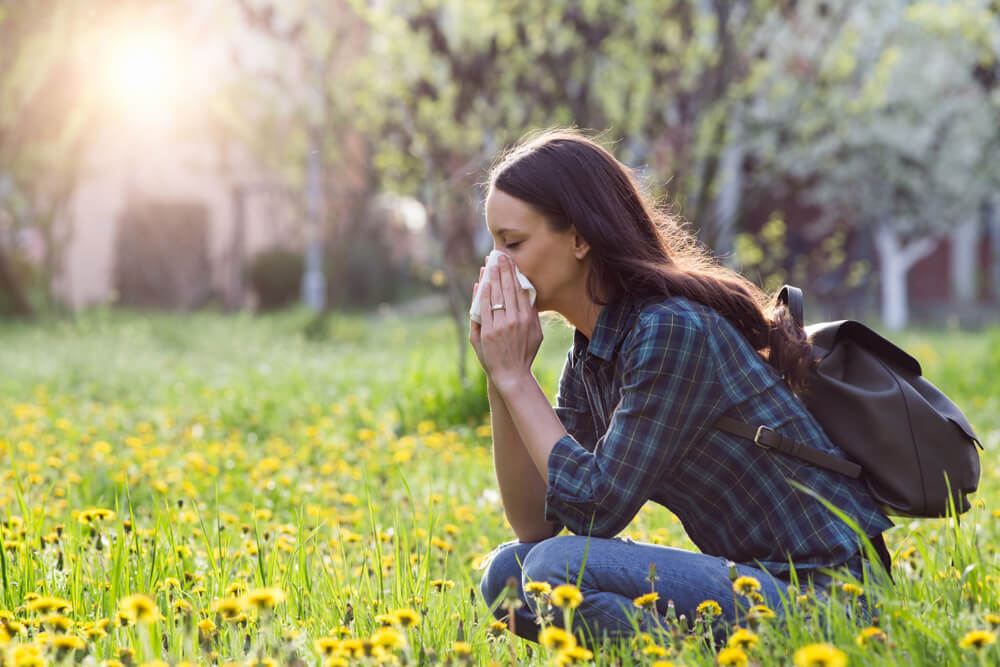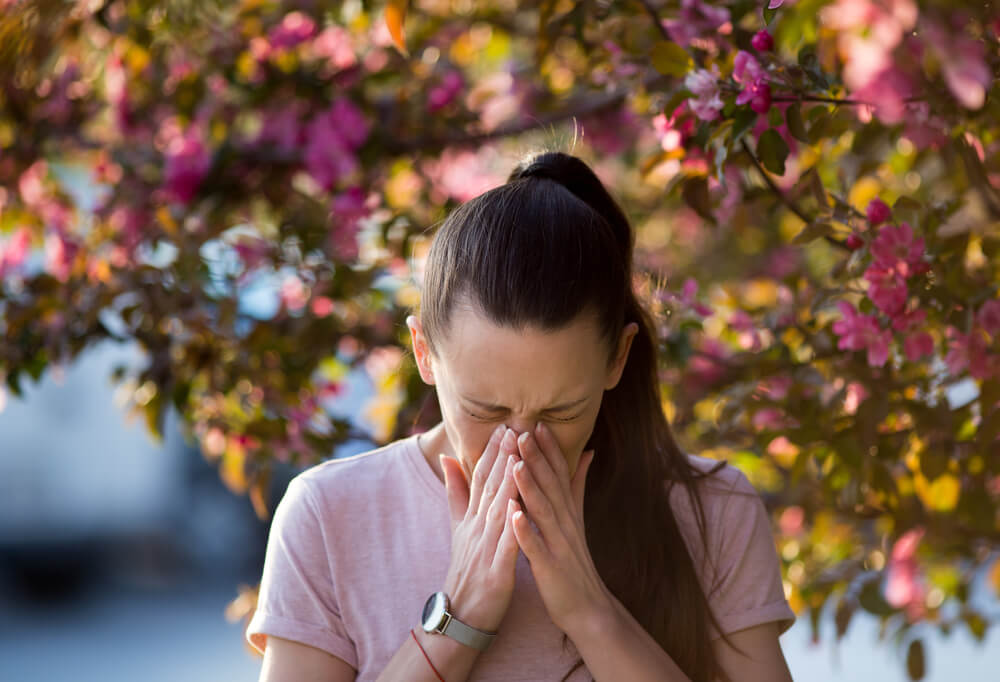Allergy season is an unavoidable ordeal for millions, especially during early spring. When specific plants go into bloom, and the air fills with tiny pollen particles, those suffering from seasonal allergies know all too well the onslaught of symptoms that can follow. From a relentless runny nose and itchy eyes to sneezing fits and difficulty breathing, seasonal allergies pose a genuine concern for public health, especially during March allergies.
These unpleasant symptoms disrupt daily life and can significantly affect the overall quality of life. Preparing for the allergy season and implementing ways to manage and alleviate allergies effectively is essential. By taking proactive measures, you can reduce the severity of your allergies, maintain control over your symptoms, and keep from becoming one of those statistics. Consult the Allergy and Immunology Center specialists for expert guidance and personalized allergy management plans.
Understanding the typical allergy symptoms, knowing the allergy forecast, taking proper allergy relief medications, and learning about other practical preventive tips and remedies can be instrumental in navigating seasonal allergies. Thus, let’s deep dive into the valuable ways to prepare for the allergy season and, in doing so, help you maintain your health and normalcy during these challenging months.
Understanding Allergy Season
When managing springtime allergies effectively, the crucial first step is understanding what allergies are and how they impact individuals. An allergic reaction is an overreaction of the body’s immune system to certain substances, known as allergens, which it identifies as harmful.
This response triggers symptoms such as watery eyes, blocked or runny nose, itching, and sneezing, famously known as seasonal allergies. Allergens are not typically harmful and do not affect people who aren’t allergic.
Allergies can be perennial, happening year-round, or seasonal, occurring during particular times of the year. The pollen allergy season, synonymous with seasonal allergies, typically occurs during spring or fall. When looking at the allergy season forecast, it’s worth noting that the severity of allergic symptoms can vary from one season to another based on pollen output, heat, wind, humidity, and rain.
Common Triggers During Allergy Season
Allergy triggers vary with different seasons. For instance, spring allergy season is usually marked by tree pollen from species like:
- Oak,
- Pine,
- Maple,
- Birch.
Conversely, the summer season is notorious for grass pollens, such as:
- Timothy grass
- Kentucky bluegrass,
- Ryegrass.
In contrast, fall allergy triggers usually include weed pollens, including:
- Ragweed,
- Nettle,
- Mugwort.
Another common fall trigger is mold spores, which thrive in damp areas. In addition, people sensitive to dust particles might notice an escalation of the symptoms during winter when dust mites abound indoors.
Allergies to these triggers can cause allergic rhinitis or hay fever, which features symptoms like sneezing, stuffy nose, runny nose, watery eyes, and itching of the nose, eyes, or the roof of the mouth. This condition varies in severity and duration for different individuals and requires tailored approaches to manage effectively.
Preparation Before the Allergy Season
Being proactive and preparing in advance can play a significant role in curbing the impact of seasonal allergy symptoms. Armed with an understanding of your allergy triggers and the upcoming allergy season forecast, a sound plan can help reduce the severity of symptoms.
Steps to Take Before The Allergy Season
The preparation for allergy season includes several actions, such as seeking a medical check-up. If you suspect having seasonal allergies, getting an allergy test to identify your triggers is advisable. Once these allergens are known, a healthcare professional can recommend the best allergy medicines or allergen immunotherapy treatments tailored to your allergy profile.
Over-the-counter allergy remedies, such as antihistamines, decongestants, and nasal steroid sprays, can relieve seasonal allergies. They can control symptoms, making pollen allergy season more bearable. However, these should be taken under professional guidance.
Home preparations also form a crucial part of this process. As pollen can get carried indoors, maintaining a clean environment can keep allergens to a minimum. Regular vacuuming, changing bedding and curtains, and installing high-efficiency particulate air (HEPA) filters can help filter out allergens and purify indoor air.
The Role of a Balanced Diet, Wellness Routines and Exercise
A healthy lifestyle plays a crucial role in building resilience against allergies. A balanced diet rich in fruits, vegetables, and whole grains can strengthen the immune system, preparing it to handle allergens better. Regular exercise, too, can boost your immune system. At the same time, wellness routines such as adequate sleep and stress management can help maintain your body in its best state to fight off allergic reactions during the allergic rhinitis season.
Particular foods have natural anti-inflammatory properties, which can help alleviate allergy symptoms. These include omega-3-rich foods like:
- fish,
- flax seeds,
- walnuts,
- fruits and vegetables.
Also, hydration must be considered, as drinking plenty of water can help thin the mucus in the nasal passages, reducing symptoms of a stuffy nose and sore throat.
Management During the Allergy Season
While preparation is crucial, proper management during the allergy season can significantly improve one’s quality of life. An integrated management plan can help control the symptoms, from medication and home remedies to avoiding triggers.

Effective Management Strategies During the Allergy Season
Depending on the severity of the seasonal allergy symptoms, one might require allergy relief medication during the pollen allergy season. If you’ve been prescribed medication, take them consistently as directed by your healthcare professional. For severe cases, allergen immunotherapy treatment might provide a long-term solution.
In addition to using the best allergy medicines, adopting specific preventative measures can make a significant difference. Limiting outdoor activities, especially on windy days and early morning when pollen counts are highest, can reduce exposure to allergens. It’s also advisable to wear sunglasses outdoors to provide eye allergy relief by blocking pollen from reaching your eyes.
Home remedies can also help manage allergy symptoms. Nasal irrigation with salt water can clear the nasal passages of allergens and relieve sinus symptoms. Additionally, staying hydrated can thin the mucus in your nose, easing congestion and making you more comfortable.
The Significance of Mental Health During Allergy Season
Allergies can take a toll not only on physical but also on mental health. Those suffering from hay fever season can feel frustrated or helpless due to persistent symptoms, disrupting their daily life. Therefore, stress management is critical during this time. Mindfulness techniques, such as yoga and meditation, can help cope with the stress related to allergies.
Moreover, maintaining a positive attitude can significantly influence how you manage and experience allergies. Embracing a wellness mindset promotes proactive health behaviors, enhancing your capacity to cope effectively with allergies. Therefore, prioritizing mental health is as crucial as addressing physical health when managing your allergies effectively.
Wrapping Up: Navigating the Allergy Season with Confidence
For those affected by allergies, each new bloom of spring or falling leaf in autumn might seem like a daunting heralding of symptoms to come. Seasonal allergies, be they spring allergy season or fall allergy triggers, have the potential to significantly affect the quality of one’s life, transforming beautiful seasons into periods of discomfort.
However, this does not necessarily have to be the case. By understanding the nature of allergies, their common triggers, and potential symptoms, you are already halfway towards achieving successful allergy management. Preparation, including proper medical check-ups, home adjustments, a balanced lifestyle, and mental health just ahead of the allergy season forecast, are all significant steps toward reducing the intensity of seasonal allergy symptoms.
As allergy season sets in, active management of symptoms becomes crucial. This involves a commitment to taking prescribed allergy relief medications, avoiding known triggers, and also adopting beneficial home remedies. Furthermore, acknowledging the psychological impacts of allergies and prioritizing care for mental health would ensure an integrated approach to allergy management.
Remember, while allergies feature an aspect of unpredictability, the control remains in your hands. The key lies in preparation and management, essential to making your allergy season a bearable experience. The spirit of this is not just about resilience but taking the power back and living life to the fullest. After all, seasons are about changes, renewal, and beauty; allergies should not hinder you from experiencing this beauty.


